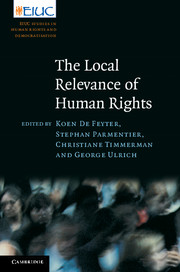Book contents
- Frontmatter
- Contents
- Contributors
- Series editors' preface
- Preface
- Abbreviations
- 1 Introduction: reconsidering human rights from below
- 2 Sites of rights resistance
- 3 Freedom from want revisited from a local perspective: evolution and challenges ahead
- 4 Relevance of human rights in the glocal space of politics: how to enlarge democratic practice beyond state boundaries and build up a peaceful world order
- 5 The local relevance of human rights: a methodological approach
- 6 Ensuring compliance with decisions by international and regional human rights bodies: the case of the European Committee for the Prevention of Torture
- 7 Building rights-based health movements: lessons from the Peruvian experience
- 8 Defining human rights when economic interests are high: the case of the western Shoshone
- 9 Struggling to localise human rights: the experience of indigenous peoples in Chile
- 10 Enforcing environmental rights under Nigeria's 1999 Constitution: the localisation of human rights in the Niger Delta region
- 11 Conflict resolution through cultural rights and cultural wrongs: the Kosovo example
- 12 Epilogue: widening the perspective on the local relevance of human rights
- Index
- References
4 - Relevance of human rights in the glocal space of politics: how to enlarge democratic practice beyond state boundaries and build up a peaceful world order
Published online by Cambridge University Press: 07 October 2011
- Frontmatter
- Contents
- Contributors
- Series editors' preface
- Preface
- Abbreviations
- 1 Introduction: reconsidering human rights from below
- 2 Sites of rights resistance
- 3 Freedom from want revisited from a local perspective: evolution and challenges ahead
- 4 Relevance of human rights in the glocal space of politics: how to enlarge democratic practice beyond state boundaries and build up a peaceful world order
- 5 The local relevance of human rights: a methodological approach
- 6 Ensuring compliance with decisions by international and regional human rights bodies: the case of the European Committee for the Prevention of Torture
- 7 Building rights-based health movements: lessons from the Peruvian experience
- 8 Defining human rights when economic interests are high: the case of the western Shoshone
- 9 Struggling to localise human rights: the experience of indigenous peoples in Chile
- 10 Enforcing environmental rights under Nigeria's 1999 Constitution: the localisation of human rights in the Niger Delta region
- 11 Conflict resolution through cultural rights and cultural wrongs: the Kosovo example
- 12 Epilogue: widening the perspective on the local relevance of human rights
- Index
- References
Summary
Local governments for a fruitful sharing of the ‘responsibility to protect’ within a multilevel scheme of governance
A more visible and effective role for local governments in the international arena is indispensable in order to reverse the dramatic regression of international politics in the past two or three decades, marked by the orgy of deregulation, unilateralism, rearmament and ‘easy wars’. At this schizophrenic moment of history, when a handful of powerful leaderships, even if in response to terroristic behaviour and economic or financial failures, are attempting to push back to the Westphalian era the ‘new’ international law that has been developing since the adoption of the United Nations Charter and the Universal Declaration of Human Rights, it is absolutely necessary to foster and nurture the virtuous strategic alliance between the genuine protagonists of a human-centric peaceful change pursued on a glocal scale: I refer to local governments (municipalities, regions, Länder) and transnational social movements.
While celebrating the sixtieth anniversary of the Universal Declaration of Human Rights, we can all see that the planet is certainly more interdependent and globalised than in 1948. It only increases the need for having multilateral institutions capable of ‘deciding’ and carrying out international public policies for the equitable distribution and the transparent running of global public goods, including peace, security, development and the environment. Historical circumstances, should they be honestly interpreted with regard to the real needs of people all over the world, do advocate the strengthening of the United Nations, together with that ‘new’ law for which the UN exists, the international law of human rights. It should be emphasised that the UN and international legality share the same destiny.
- Type
- Chapter
- Information
- The Local Relevance of Human Rights , pp. 82 - 108Publisher: Cambridge University PressPrint publication year: 2011
References
- 3
- Cited by

